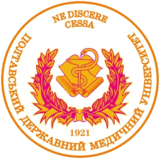Будь ласка, використовуйте цей ідентифікатор, щоб цитувати або посилатися на цей матеріал:
http://repository.pdmu.edu.ua/handle/123456789/22990| Назва: | Serum Level of Brain-Derived Neurotrophic Factor and Thrombotic Type Are Predictive of Cognitive Impairment in the Acute Period of Ischemic Strokes Patients |
| Автори: | Havlovska, Ya. Yu. Lytvynenko, N. V. Shkodina, A. D. Гавловська, Ярослава Юріївна Литвиненко, Наталія Володимирівна Шкодіна, Анастасія Дмитрівна |
| Дата публікації: | 2023 |
| Видавець: | Hindawi |
| Бібліографічний опис: | Havlovska Ya. Yu. Serum Level of Brain-Derived Neurotrophic Factor and Thrombotic Type Are Predictive of Cognitive Impairment in the Acute Period of Ischemic Strokes Patients / Ya. Yu. Havlovska, N. V. Lytvynenko, A. D. Shkodina // Neurology research international. – 2023. – Vol. 2023. – P. 5578850. |
| Короткий огляд (реферат): | 40–70% of patients after a stroke, including a mild one, may experience cognitive impairment. Brain-derived neurotrophic factor (BDNF) plays a significant role in the pathogenesis and rehabilitation of ischemic stroke and also affects the patients' recovery prognosis. An association between cognitive impairment in the poststroke period and lower peripheral BDNF levels is known, but the prognostic significance of serum BDNF levels and clinical characteristics for the risk of developing cognitive impairment in the acute period remains uncertain. We conducted a prospective cohort study of patients in the acute phase of ischemic stroke. Clinical examination, assessment of neurological status, neuropsychological testing, and laboratory analyzes were performed on patients at 1 and 14 days after ischemic stroke. The state of cognitive functions was assessed by the Mini-Mental State Examination scale. Quantification of BDNF in blood serum was performed by solid-phaseenzyme-linked immunosorbent assay (ELISA). We found that within 14 days after an acute ischemic stroke, we found a decrease in the clinical severity of patients compared to 1 day of the onset of the disease before the start of treatment and a significant decrease in the level of BDNF in the blood serum of patients with ischemic stroke both on the first and on the 14th day. However, during the 2 weeks of the acute period, no significant changes were detected, despite the general improvement of the clinical condition. In our study, cognitive impairment was found in almost half of the patients on the first day of ischemic stroke, and there was no significant reduction in this prevalence over 2 weeks. We found that a low level of BDNF and a thrombotic subtype of ischemic stroke can be risk factors for cognitive impairment in the acute period, which can be useful in planning treatment and rehabilitation measures. У 40–70% пацієнтів після інсульту, в тому числі легкого, можуть спостерігатися когнітивні порушення. Нейротрофічний фактор головного мозку (BDNF) відіграє значну роль у патогенезі та реабілітації ішемічного інсульту, а також впливає на прогноз одужання пацієнтів. Відомий зв’язок між когнітивними порушеннями в постінсультному періоді та нижчими периферичними рівнями BDNF, але прогностичне значення рівнів BDNF у сироватці крові та клінічних характеристик для ризику розвитку когнітивних порушень у гострому періоді залишається невизначеним. Проведено проспективне когортне дослідження пацієнтів у гострій фазі ішемічного інсульту. Пацієнтам проводили клінічне обстеження, оцінку неврологічного статусу, нейропсихологічне обстеження та лабораторні аналізи на 1 та 14 добу після ішемічного інсульту. Стан когнітивних функцій оцінювали за шкалою Mini-Mental State Examination. Кількісне визначення BDNF у сироватці крові проводили за допомогою твердофазного імуноферментного аналізу (ІФА). Встановлено, що протягом 14 днів після гострого ішемічного інсульту спостерігалося зниження клінічної тяжкості хворих порівняно з 1 добою від початку захворювання до початку лікування та достовірне зниження рівня BDNF у сироватці крові. пацієнтів з ішемічним інсультом як на першу, так і на 14-ту добу. Проте протягом 2 тижнів гострого періоду суттєвих змін не виявлено, незважаючи на загальне покращення клінічного стану. У нашому дослідженні когнітивні порушення були виявлені майже у половини пацієнтів у перший день ішемічного інсульту, і не було значного зниження цієї поширеності протягом 2 тижнів. Ми виявили, що низький рівень BDNF і тромботичний підтип ішемічного інсульту можуть бути факторами ризику когнітивних порушень у гострому періоді, що може бути корисним при плануванні лікування та реабілітаційних заходів. |
| Ключові слова: | brain-Derived Neurotrophic Factor cognitive Impairment ischemic Stroke stroke Subtype нейротрофічний фактор мозку когнітивні порушення ішемічний інсульт підтип інсульту |
| DOI: | 10.1155/2023/5578850 |
| URI: | http://repository.pdmu.edu.ua/handle/123456789/22990 |
| Розташовується у зібраннях: | Наукові праці. Кафедра нервових хвороб |
Файли цього матеріалу:
Усі матеріали в архіві електронних ресурсів захищені авторським правом, всі права збережені.



